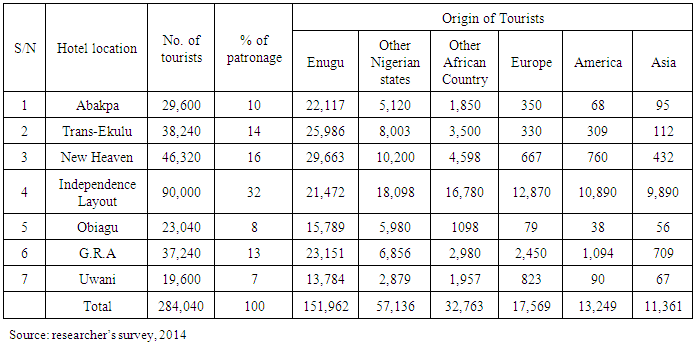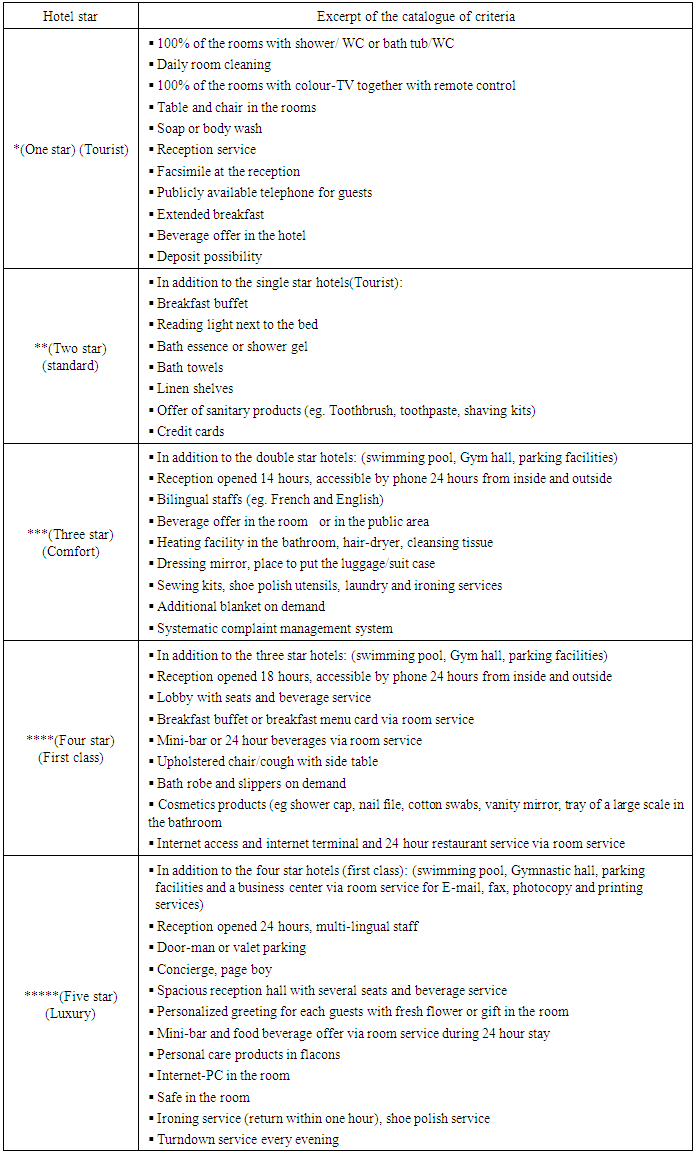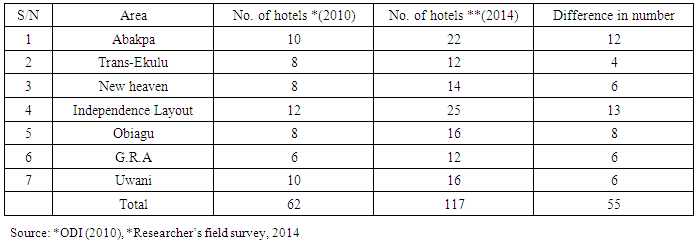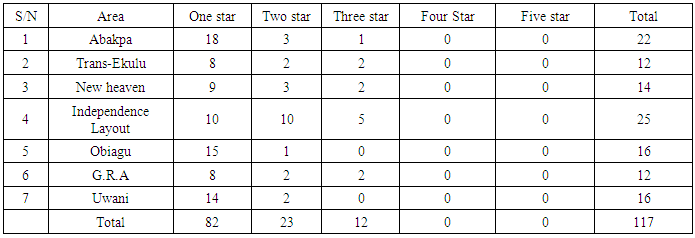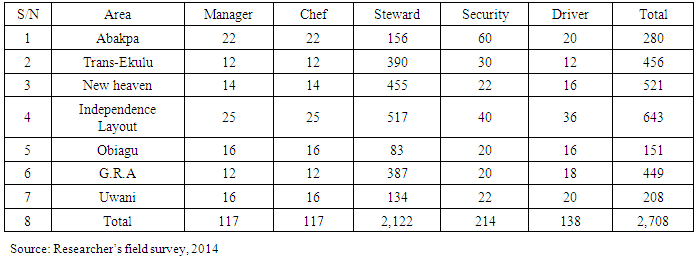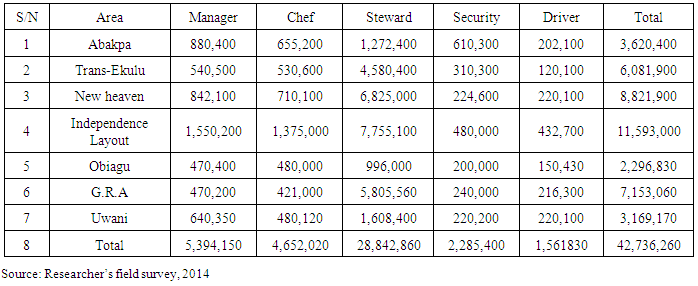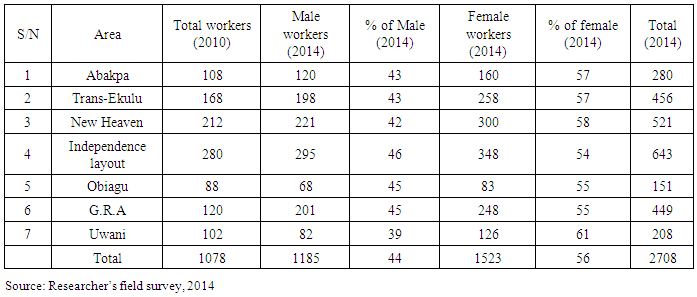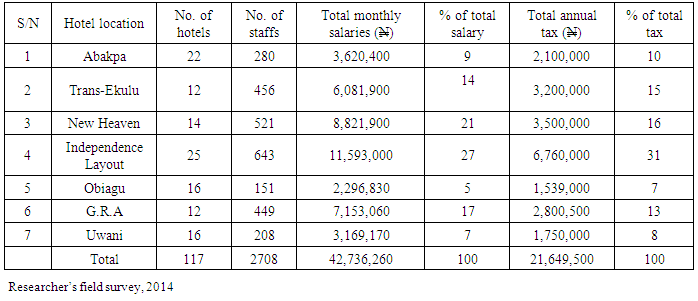-
Paper Information
- Paper Submission
-
Journal Information
- About This Journal
- Editorial Board
- Current Issue
- Archive
- Author Guidelines
- Contact Us
American Journal of Tourism Management
p-ISSN: 2326-0637 e-ISSN: 2326-0645
2015; 4(3): 43-53
doi:10.5923/j.tourism.20150403.01
Assessing the Impacts of Hospitality Industry in Enugu City, Nigeria
Anim O. Ajake
Department of Geography and Environmental Science, University of Calabar, Nigeria
Correspondence to: Anim O. Ajake , Department of Geography and Environmental Science, University of Calabar, Nigeria.
| Email: |  |
Copyright © 2015 Scientific & Academic Publishing. All Rights Reserved.
Tourism destination competitiveness depends on a viable recreation and hospitality facilities that often represent the destination products. The study assessed the impact of hospitality industry on the development of Enugu city. Data was basically from questionnaire survey and participatory research method. Data generated were analyzed descriptively using simple percentage, mean, charts, graphs and tables. Students’t-test was employed to examine the level of significance between the people involved in tourism and non-tourism related activities in the study area. The result revealed that the calculated t-value of 2.8 is greater than the critical t-value of 1.76 which means that there was a significant difference between people involved in tourism and non-tourism related activities in the study area. It was also observed that 70% of the lodgings in the hotels were by local residents while the remaining 30% was recorded by visitors from outside the state and that only 20% of the hotels have recreational facilities. Based on the findings, it is recommended that managers of hotels should improve the standard of services and equip their hotels with modern recreational facilities while government and private investors should host events in the state to increase patronage of the hotels.
Keywords: Recreational facilities, Accommodation, Local residents, Hotels, Hospitality, Competitiveness
Cite this paper: Anim O. Ajake , Assessing the Impacts of Hospitality Industry in Enugu City, Nigeria, American Journal of Tourism Management, Vol. 4 No. 3, 2015, pp. 43-53. doi: 10.5923/j.tourism.20150403.01.
Article Outline
1. Introduction
- Tourism is a product that relies totally upon simultaneous production and consumption of destination based products [1, 2]. The implication of this for the destination’s host community is that it will come into contact with an alien population during the production process. This contact can be beneficial or detrimental to the host community depending upon the difference in cultures and the nature of the contact [3, 4].Tourism can grow and be sustained when host communities have a positive attitude towards it and when they see their role in the process of the tourism development as being rewarding and vital to their personal and community growth. At the point tourism activities are initiated in a destination, the quality and value of life of the local hosts goes through radical changes, which are not necessarily negative [5, 6].According to the World Travel and Tourism Council, the hospitality industry plays a vital economic role in local communities throughout the world. Travel and tourism is one of the world’s largest industries, generating US$6 trillion or 9% of global GDP and supporting 260 million jobs [7]. Many of those jobs are created by the hotel sector, giving the industry a tremendous opportunity to help local communities prosper [8, 9].Tourism is ideally known to generate revenue and wealth to the investors of different nations all over the globe today, and Nigeria is endowed with so many tourist attractions as well as several tourism resources that can provide abundant business opportunities to the local and foreign prospective tourism investors viz-a-vis increase Government earnings [10, 11]. Furthermore, Nigeria being a giant land blessed with the Savannah-Sahel in the North, the Hills and Mountains in the East and the Lagoons and Forests in the West is blessed with attractions that can adequately enhance the revenue portfolio of the Nation. However, tourism will not receive the desired attention without relatively discussing the accommodation aspect which attracts fifty percent (50%) of the tourist expenditure at an average, at any point in time [12]. The tourism industry with the hotel, motel and catering being integral parts of it and any consideration of the hotel industry as an engine of growth needs to take into account the multiplier effect which it also possess [13]. Hotels are classified according to the hotel size, location, target markets, levels of service, facilities, number of rooms, ownership and affiliation etc. In most developed countries of the world, the impacts of hotels go well beyond providing rooms and jobs, but the economic reach of the hotel sector extends far beyond its direct contributions to taxes, employment, income and GDP [14]. The supply chain of the industry has a knock-on effect, creating business activity in nearly all other economic sectors [15]. Hotel guests spend money in the retail, recreational, transportation and restaurant outfits and hotels provide a forum for business meetings, trade shows and conventions which in turn generate economic growth [16]. It is widely recognized that tourism is an important factor that can contribute to the development of market-oriented economy. It can also be emphasized that tourism is directly linked with the cultural, economic and intellectual potential of a country and the current statistical data show that tourism is defined as one of the most profitable and rapidly developing industries in the world. It was noticed that in the early 21st century that the number of tourists increased dramatically and consequently the revenues from tourism increased considerably [17, 18]. This could be traced to the advancement in technology, trade and the transport sector [6, 9, 13].In recent times, economists have observed that diversification of a country or region’s economy is a sign and powerful factor of development and a sustainable source of wealth [19]. This is to say that if a country or region’s hope of economic survival is dependent on an industry, then such industry is bound to experience pressure on its facilities and resources which may lead to economic recession which would cause poverty and starvation among the people and a breakdown of economic activities within such a region [20, 21, 22]. With the experience of the recent economic recession around the world, most developed and developing countries have embraced tourism as a major option of diversifying their economy and the choice to develop tourism in such countries has been observed to work as a boost to their economy [23]. This has promoted the involvement of countries in tourism development and this recent increase in tourism activities around the world have also been reported to be accompanied with negative impacts especially where it is not practiced responsibly [24, 25]. In most of the countries where tourism have really propelled the economy to greater heights, it has been discovered that the hospitality industry especially the hotels are seen as the main nucleus of its positive impacts through job creation, foreign exchange generation, income generation, incentive for elongated duration of tourists stay and image promotion [26, 27]. The hotel industry has been reported to have overbearing direct impacts on the economy of its host community through the provisions of employment (although in some cases temporal and insecure), structural development, exposure, income generation, foreign exchange generation, it also has indirect impacts on the economy of its host community through its boost on the existence and survival of support tourists’ facilities like; the transport sector, tour guides, arts and craftsmen, food and beverages sector, security operatives, restaurants, drinking spots, club houses and the local market men and women who all benefit from the trickle-down effect or multiplier effect of the tourists’ presence whose duration of stay is most determined by the satisfaction upon the services and facilities rendered by the hotel industry [28, 29]. In the Gambia, for instance, 30% of the workforce depends directly or indirectly on tourism [25]. Also in small Island developing countries, significant part of the citizens depends on tourism such as; 83% in the Maldives, 21% in the Seychelles and 34% in Jamaica while Malta has only 380,000 residents, it received over 1.2 million tourists in 2009 and tourism generated more than $650 million in foreign exchange earnings (25% of its GDP). Malta's high dependence on tourism and a limited number of export products makes its trade performance vulnerable to shifts in international demand [7, 30].Nigeria cannot be left out in this strive towards economic growth through hotel development as its hospitality industry has shown tremendous strength in the aspect of human resources and structural development and also recognizing the fact that the dependence of the country’s economy is gradually shifting from the oil sector to the tourism sector. Enugu city has also experienced a boost in the tourism development through the rapid increase in the number of hotels in the city [31, 32]. The hotel industry in Enugu which started with the establishment of The Dayspring hotel at Lagos Street in 1955 and later had the establishment of the Atlantic hotel at Ogidi street, Night life hotel, Olympic hotel and the Presidential hotel etc. In recent times, the City have observed a great increase in the number of hotels and all these has been observed to have an over-bearing influence on the social, economic, cultural and aesthetic development and transformation of the city. However, there is a dearth and unavailability of information on the subject matter due to the fact that there are no published literatures on the inventory and standard of the hotel industry in Enugu city. Considering the incessant increase in the state of unemployment in the country, it is worthy of note that the tourism industry in Nigeria has experienced a steady increase in the rate of tourists’ arrivals and tourism activities within the country but it is imperative to also note that lack of Government and private investors interest can be said to be the greatest challenge of the industry that have slowed the development of the industry in the country and Enugu State in particular. It is in this regards that this paper seek to investigate the impacts of the hotel industry in the development of Enugu city.
2. Research Method
- Enugu city is the capital of Enugu State in Nigeria and is located in the South-Eastern part of Nigeria and is largely populated by the Ibos, an ethnic group in Nigeria. The city has a population of 722,664 according to the 2006 Nigerian census and a projected population of 4,061,808 in 2013 [33]. The name Enugu was derived from the two Igbo words Enu and Ugwu meaning "top of the hill" or Hill top, denoting the city's hilly geography. Enugu is a city blessed with numerous natural and cultural tourism resources. This study is an exploratory cross-sectional survey devoid of control but a one-time observation of independent and non-manipulated variables and covered hotels within Enugu city. Primary and secondary sources of information were employed to elicit data for this study. The Primary source involved the use of questionnaire survey with open ended questions which were administered to managers and workers in the various hotels within the city and also to purposively selected residents, mainly those engaged in economic activities and businesses within the city to elicit information on their participation and involvement in tourism development. Information on staffs’ strength and salaries was derived from a questionnaire survey on managers of various hotels in the city. A total of 300 questionnaires were duly completed and returned by the respondents Interview sessions which were strictly guided by a participatory research method was also held with the management of hotels in the city and management staffs of the State Ministry of Tourism to help elicit information on the economic implication of the hotels to the State economy. The secondary source of information involved the use of available recorded information in the hotels and the State Ministry of Tourism and the State internal revenue office to help the researcher elicit information on the origin of the tourists, their purpose of visit and duration of stay; date of establishment of hotels, taxation rate by government and the total annual tax generated by the State from the hotels. The city was delineated into seven zones of Abakpa, Trans-Ekulu, New Heaven, Independence Layout, G.R.A, Obiagu, Uwani and inventory of the number of hotels in the various areas were collated. Data for this study was analyzed with the use of descriptive and inferential statistical techniques. The descriptive techniques involved the use of tables, charts, simple percentages, mean and standard deviation while the inferential statistical techniques involved the use of t-test statistical technique to examine the level of significance between those involved in tourism and non-tourism related activities within the study area.
3. Results and Discussion of Findings
- Local people’s involvement in hotel industry activitiesThe study examined the viability of the hospitality industry on the people of the study area. It was realized that among the 473 respondents used for this study, 270 representing 57 percent of the sample population were involved in hospitality industry related jobs such as hotel jobs, restaurants, transport, while 203 representing 43 percent of the population were involved in non-tourism related jobs like civil service, artisan, farming and hunting within the study area. This implies that more people in the study were involved in tourism related activities than the non tourism related ones.Furthermore, in order to confirm if there is a significant difference in the number of people employed in tourism and non-tourism related activities in the study area (Table 1). The result on Table 1b shows that the calculated t-value of 2.8 is greater than the critical t-value of 1.76 needed for significance with 12 degree of freedom.
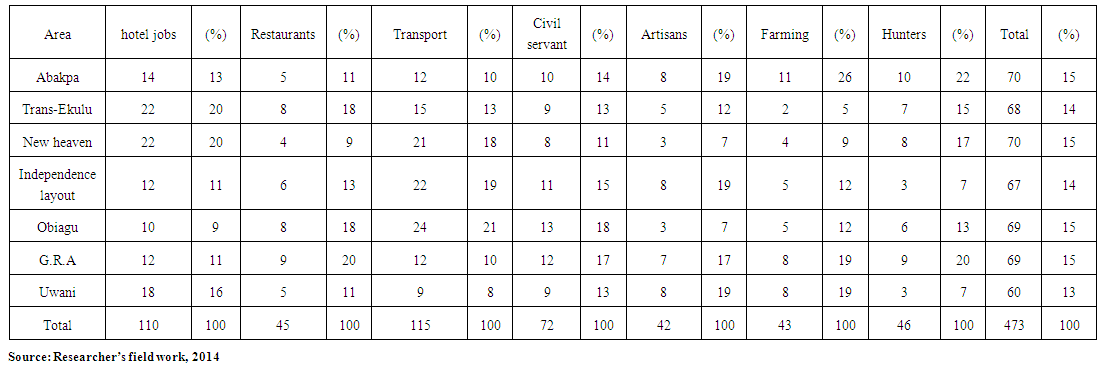 | Table 1. Occupational structure of the study population |
|
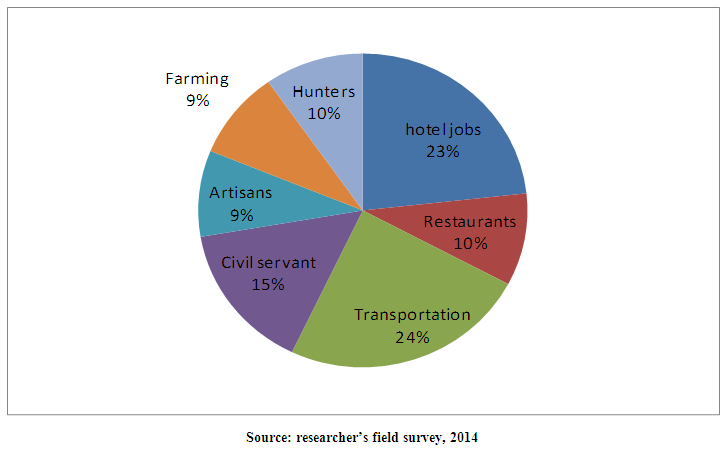 | Figure 1. Occupational structure of respondents in the area |
|
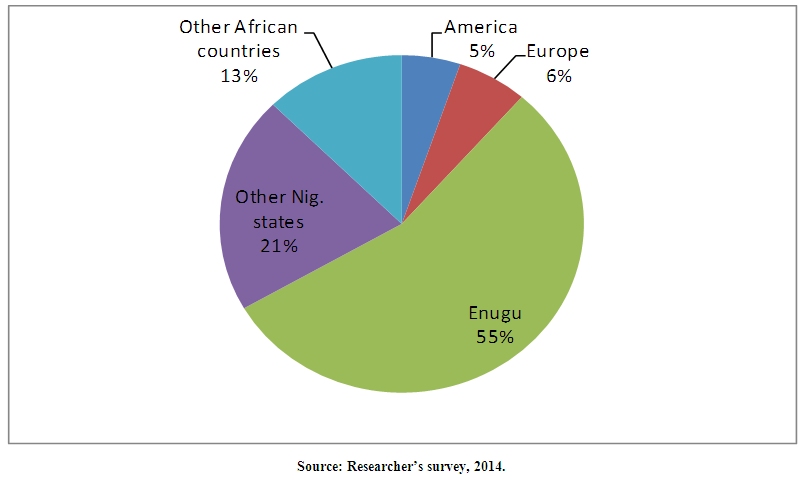 | Figure 2. Origin and types of tourists’ or persons that spent night in the hotels in 2013 |
|
|
|
|
|
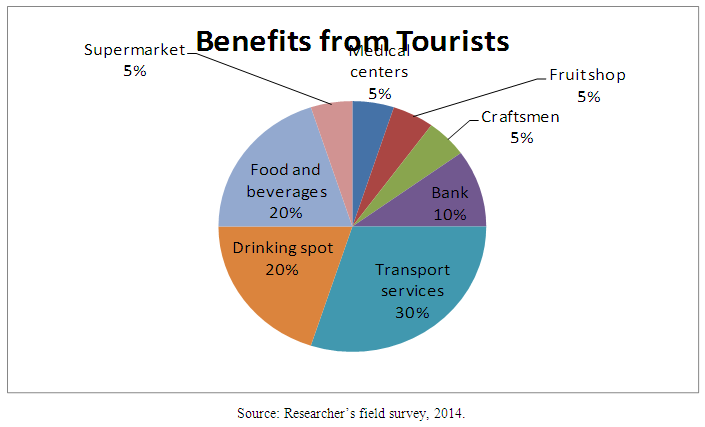 | Figure 3. Impacts of hotels on other sectors in Enugu city |
|
|
4. Discussion of Findings
- Impact of hotels on the economic development of the peopleInformation on Table 8 shows that there was an increment in the number of staffs employed in the hotels between 2010 and 2014 with the majority of the staffs being casual workers and at the steward cadre and the females being more in number than their male counterpart. It was also discovered that the hotel industry had directly and indirectly impacted on the economy of residents and the state. It provided job opportunities for the local residents and also provided opportunities for the people to enhance their economy through participation in tourism related activities. The outcome of the interview sessions show that the hotel industry had also contributed indirectly to the growth of the local economy by supporting local suppliers of goods and services; and ensured the growth of tourism support business outfits such as tour operators, transport sector, restaurants, arts and craftsmen, super markets, fruit sellers, drinking spots etc. Impact of hotels on the economic development of the stateInformation on Table 9 shows that the hotel industry has contributed positively in the economic growth of the state with its direct contribution through salaries and tax which has seen it contribute the sum of N42,736,260.00 as monthly salaries to all staffs working in the hotels in the city and a sum of N21,649,500.00 as tax to the state government with an over-bearing indirect impacts on the economy of the state through its multiplier effect on the support facilities like the food and beverages centers, restaurants, drinking spots, medical centers, pharmacy, super markets, banks, arts and craftsmen and the transporters. This has shown that the industry has both directly and indirectly impacted positively to the economy of the residents and the state in general.
5. Conclusions and Recommendations
- It was observed that the hotel industry in Enugu city has provided a variety of benefits to the local economy. It was discovered that the industry had both direct and indirect impact on the local economy. The direct impacts involved benefits through salaries to staffs and tax to the state government while the indirect impacts involved its contribution to the supporting industries like the transport sector, restaurants, food and beverages outfits, local craftsmen, farmers, super markets, fruit sellers, drinking spot etc. Although it was also noticed that most of the hotels in the city are poorly equipped and that most of the patronage came from local residents who are based in the state. In the foregoing, the study has shown clearly that people were involved in numerous economic activities which comprises of both tourism related and non-tourism jobs. It was also observed that in examining the level of the people’s involvement in tourism related activities, it was realized that there exist a significant difference in the number of people involved in tourism and non-tourism related activities. It was also observed that there was steady increase in the available number of hotels over the years showing that there was a significant advancement in the hotel industry. In terms of patronage, the study showed that there was a steady increase in tourists’ arrivals in the area with the largest number of the hotel customer coming from within Enugu, followed by those who came from outside Enugu, then those who came from within other African Countries and the least in this category was recorded by customers who came from Asian Countries. In conclusion, it was also observed that the employment structure of thee hotels within the study area was dynamic in nature with the higher paid technical staffs recording fewer staff while the lowly paid staffs recorded more number of employment rate, clearly showing an evidence of the seasonality nature of the hotel and tourism industry. Based on these findings, I here recommend that the standard of the hotels in-terms of services and facilities be improved and that government and private stake-holders should organize or host events that will attract foreigners and visitors to the state to improve the level of patronage of the tourism facilities and henceforth enhance the influx of foreign exchange which will therefore improve the economy of individuals and the State in general.
 Abstract
Abstract Reference
Reference Full-Text PDF
Full-Text PDF Full-text HTML
Full-text HTML
